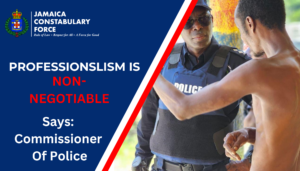
In modern policing, professionalism the cornerstone of trust and efficiency, which establishes a link between law enforcement and the community it serves. It ensures that the principles of justice are upheld and manifested in every interaction, safeguarding the delicate balance between authority and civil liberties.
In his latest weekly address to members of the Jamaica Constabulary Force (JCF) via the Force Orders, Police Commissioner Dr Kevin Blake has moved to place critical emphasis on professionalism, public interaction, and conduct. As we unpack his message, it becomes clear that Dr Blake is not just setting expectations. He is also laying down a gauntlet for further change in a sector where public perception has often skewed towards the negative.
Elevating Standards Through Professionalism
The Commissioner’s assertion that professionalism is “non-negotiable” underscores a fundamental principle: the quality of police service is paramount. This isn’t merely about adhering to guidelines or following protocols—it’s about ensuring that every officer embodies the highest standards of conduct. The goal of achieving 75% customer satisfaction, while ambitious, illustrates a commitment to improvement, acknowledging that while absolute satisfaction may be unattainable, the pursuit of it must never waver. The Commissioner explains that, “The target is 75% because there will always be unsatisfied customers even with our best effort. However, we must always strive to make even those who seem impossible to satisfy, satisfied.”
Yet, he does not shy away from confronting the less savoury elements within the JCF. His candid acknowledgment of unprofessional behaviour that has “caused significant damage to the brand and the image” of the force is a bold move. “These members, though a few, have caused and continue to cause significant damage to the brand and the image that we all have worked so hard to create and nurture,” he says, highlighting the stark reality of the situation.
The Role of Leadership and Accountability
A critical aspect of Commissioner Blake’s message is the emphasis on leadership accountability. The directive to supervisors and Divisional Commanders to take personal interest in the conduct of their subordinates elevates the role of leadership in shaping the force’s culture. “Supervisors who standby and witness the types of discourteous interactions that we see and take no action will also be held accountable,” Blake asserts, signalling a zero-tolerance policy towards negligence in supervision.
Moreover, the ramping up of activities by the Inspectorate Professional Standards Oversight Bureau (IPROB) signifies a structural commitment to these principles. “Our Professional Standards Bureau within IPROB will be ramping up its activities around this issue,” he promises, indicating a proactive approach to enforcement and reform.
Commissioner Blake’s message to the members challenges the rest of Jamaican society to reflect on our expectations of law enforcement and our role in fostering an environment that either supports or hinders such transformations. It beckons us to ask: How do societal attitudes and narratives influence police conduct and vice versa?
This engagement is crucial as it extends the conversation beyond the confines of the JCF and into the public arena where perceptions are formed and reformed. The Commissioner’s explicit mention of combating “false narratives” highlights an ongoing battle not just of policing but of perception and reputation management. It is clear from his latest column that Commissioner Blake’s mandate for ongoing change seeks to recalibrate the moral compass of the Force towards greater professionalism and accountability.







